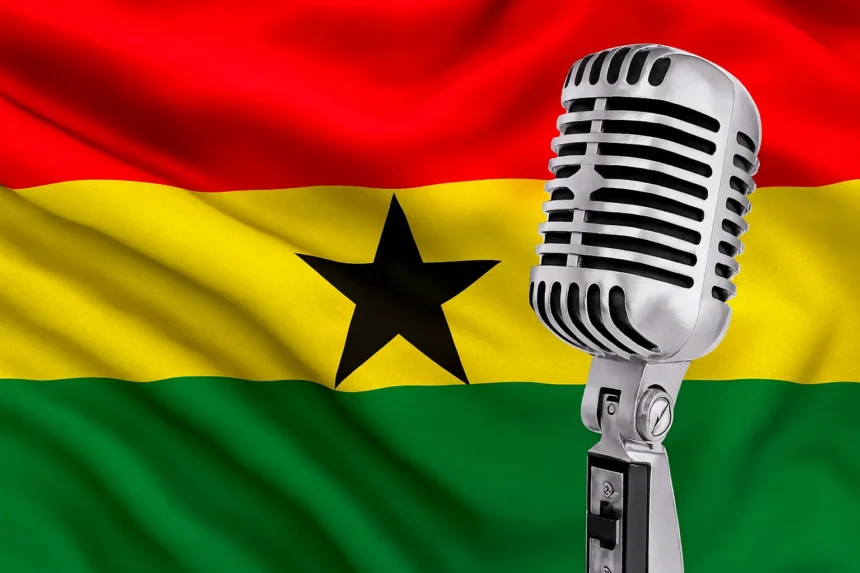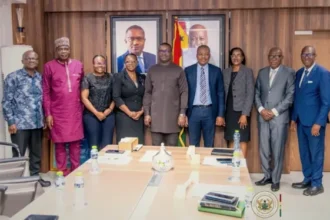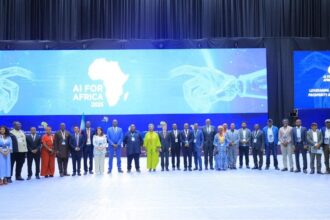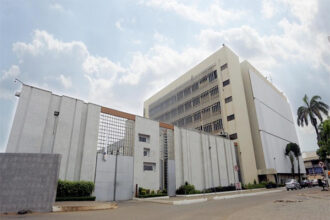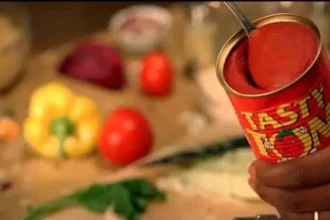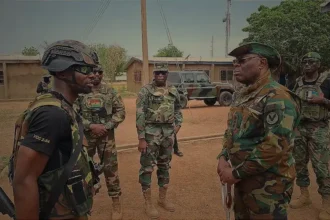When a country sings its anthem, it’s more than just a ritual. It’s a moment of collective memory, pride, and identity. A national anthem is seldom just a song; it is a musical emblem, a poetic epitaph of a nation’s journey, ideals, struggles, and dreams.
In Ghana, the anthem we sing today, “God Bless Our Homeland Ghana,” carries with it not just melody and words, but layers of change, claim, and controversy. Here’s the story behind how that anthem came to be, why parts of it were rewritten, and who lays claim to its current words.
The Ghana National Anthem: Composed by Philip Gbeho
Before 1957, the people of what was then the Gold Coast sang “God Save the Queen”, the British national anthem, at official ceremonies. But as the winds of decolonization blew across Africa, the newly independent states sought their own symbols of identity, flags, shields, and yes, national anthems.
In the lead-up to independence on March 6, 1957, the colonial administration and local leaders launched a public competition to find a replacement anthem. Out of hundreds of submissions, Philip Gbeho, a composer and teacher, won the contest for the musical composition. His piece was favored among four shortlisted entries that were broadcast on the radio, and listeners were asked to vote.
Alongside Gbeho’s music, the original lyrics submitted, written by Emmanuel Pappoe-Thompson (with contributions from Tettey Lartey), were adopted at independence, though they were already slated for revision.
First Revision: From “Lift High the Flag” to “God Bless Our Homeland”
Shortly after independence, changes began. In 1960, when Ghana declared itself a republic under President Kwame Nkrumah, a literary committee was appointed to review the lyrics of the national anthem. The goal was to refine the wording to fit the identity and aspirations of the new republic.
The changes included modifying or discarding some original lines. Some sources suggest Nkrumah wanted the anthem to be more assertive, inclusive, and easier to sing.
Still, the post-1960 version did not last unchallenged. In 1966, Nkrumah’s government was overthrown in a coup. In the turbulence that followed, many symbols and policies of the Nkrumah era were reexamined, and the national anthem was no exception.
Claims of Michael Kwame Gbordzoe
It is in the 1970s that the version of the anthem most Ghanaians know today, the one starting “God Bless Our Homeland Ghana,” was adopted. That version still uses Philip Gbeho’s melody, but the words were drawn from a competition, and allegedly written by a young student: Michael Kwame Gbordzoe.
According to Dr. Gbordzoe, he entered a nationwide contest to propose new lyrics while a student at Bishop Herman College (although the precise date is debated). His submission was chosen to replace the earlier “Lift High the Flag of Ghana” version.
Gbordzoe claims that the prior regime changes and political instability prevented his authorship from being fully recognized. He has petitioned successive governments for formal acknowledgment, but as of now, his recognition remains informal in the public domain.
This version of the lyrics is the one sung in schools, in parades, and on national occasions. Though many Ghanaians assume the words and music both stem from the same source, that is not the case: the melody (Gbeho) and the lyrics (Gbordzoe, per his claim) come from different hands.
Here’s what the Ghana National Anthem lyrics look like:
First stanza
God bless our homeland Ghana
And make our nation great and strong,
Bold to defend forever
The cause of Freedom and of Right;
Fill our hearts with true humility,
Make us cherish fearless honesty,
And help us to resist oppressors’ rule
With all our will and might forevermore.
Second stanza
Hail to thy name, O Ghana,
To thee we make our solemn vow:
Steadfast to build together
A nation strong in Unity;
With our gifts of mind and strength of arm,
Whether night or day, in the midst of storm,
In every need, whate’er the call may be,
To serve thee, Ghana, now and forevermore.
Third stanza
Raise high the flag of Ghana
and one with Africa advance;
Black star of hope and honour
To all who thirst for liberty;
Where the banner of Ghana freely flies,
May the way to freedom truly lie;
Arise, arise, O sons of Ghana land,
And under God march on for evermore!
While Gbeho’s tune remains, the words we sing today (per Gbordzoe’s claim) are not his.
Controversies, Claims, and the Question of Recognition
Why has this back-and-forth over the lyrics persisted? Several factors help explain the complexity:
- Regime changes and instability
Ghana’s post-independence history was punctuated by coups, countercoups, and shifts between civilian and military rule. In such times, symbolic institutions like the national anthem often get modified, suppressed, or reordered. Some changes may have lacked clear archival documentation. - Lack of official documentation or consistent records
Dr. Gbordzoe claims he has documents supporting his authorship, but these have not been universally accepted, perhaps because previous regimes did not prioritize formal recognition. - Public memory vs. archival truth
Many Ghanaians grew up learning that Philip Gbeho composed the national anthem, and most assume he also wrote the lyrics. That assumption is baked into the popular narrative. But in fact, Gbeho himself was explicitly recognized by the early government as the composer of the melody, not the words. - Calls for recognition
Over the years, Gbordzoe has made public appeals to the government for formal acknowledgment. Some media outlets refer to him as the “writer of the current Ghana national anthem lyrics.” - Alternative anthems in popular imagination
Interestingly, Ghana also has an unofficial, deeply beloved patriotic song called “Yɛn Ara Asaase Ni” (“This Is Our Own Land”), written by ethnomusicologist Ephraim Amu in 1929. That song was once among the finalists in the initial anthem selection, and many people still lobby to make it the official anthem, or at least allow it a more prominent place in national ceremonies.
Because of all these factors, the anthem’s authorship is more than just a trivia question: it touches on identity, memory, power, and whose contributions get honored in a nation’s official narrative.
Why It Matters
Does this debate over who wrote the current lyrics really matter? I’d argue yes and for several reasons:
- Recognition and dignity
If someone’s words become part of the essential identity of a country, sung by millions, recognition isn’t just symbolic. It’s a matter of legacy, authorship, and intellectual heritage. - Historical clarity
For educators, historians, and curious citizens, understanding how and why certain words were chosen illuminates broader cultural and political shifts in Ghana’s history. - National unity through truth
Symbols like anthems, emblems, and pledges are meant to unite people across lines of tribe, religion, and region. If parts of their origin remain murky or disputed, that unity is partly built on myth. Truth strengthens, rather than weakens, collective identity. - Inspiring future writers
Young poets, students, and musicians should know that words matter, that nations listen, and that recognition is part of the contract between creators and the society they serve.
In Closing
The anthem we sing as Ghanaians today is layered: a melody by Philip Gbeho, and words that, though widely attributed to him in popular memory, are claimed by Michael Kwame Gbordzoe (and never officially recognized).
Over the decades, changing regimes altered lines, rewriting how the nation thought of itself. Yet, through all that, one constant remains: when “God Bless Our Homeland Ghana” rings out in schools, stadiums, or state ceremonies, it is a unifying moment.
But perhaps it’s time Ghana afforded the same dignity to its lyricist that the anthem gives to the country by looking honestly at the authorship claims and, if merited, giving formal recognition. After all, a nation’s song should carry not just history, but also the integrity of whose voices helped write it.


